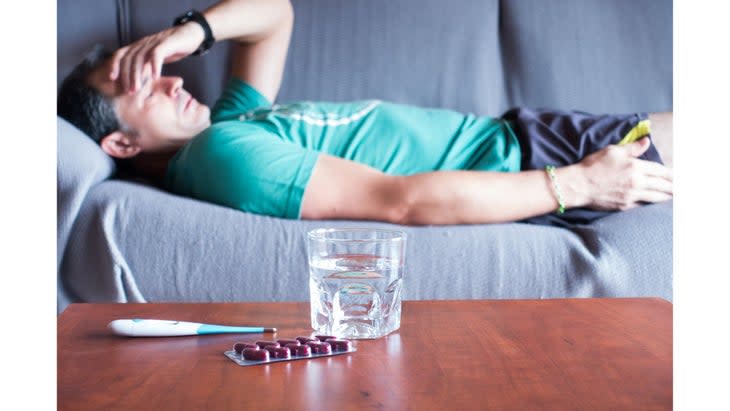Why Do I Tend to Get Sick After Racing?
This article originally appeared on Triathlete
When you crossed that finish line, you had never felt stronger. But less than two days later, you've never felt sicker. What gives?
"If you've raced and developed an upper respiratory tract infection the following day, you're not alone," says Dr. Leah Roberts of SteadyMD. "You're most vulnerable to getting sick 72 hours post-race."
When the body is stressed, it produces increased levels of cortisol, a hormone that suppresses many of the body's defense mechanisms against germs. This happens whether the stress comes in the form of a pressing deadline at work or an argument with a spouse. Race day, however, takes stress to the max with a complex recipe of physical effort, mental exhaustion, sleep deprivation before an early start, and pre-race nerves. By the time the race is over, it's more than just the legs that need some time to recover.
Though training is designed to prepare the body to cope with the demands of race day, it's not an identical, and your immune system knows it: "High-intensity training sessions are geared to simulate race conditions, but nothing can replace the actual race experience and stress," says Dr. Roberts.
Instead, Dr. Roberts says protecting and fortifying the body when the immune system is particularly weak can go a long way in avoiding post-race illness.

How to avoid getting sick after a race
Eat up
Post-race, the most important immune booster is food. "Rehydrate and refuel with carbohydrates, which help to decrease the production of cortisol." The jury is still out on whether antioxidants decrease inflammatory markers during this stage, but in general, it's a good idea to pick fruits and vegetables over processed foods. Skip the mega-doses of Vitamin C: "Multiple studies have failed to demonstrate that vitamin C supplementation pre-race or during increased training have boosted immunity," says Roberts.
RELATED: You'd Better Eat For Immunity's Sake
Reduce your risk
"The effects of high cortisol and decreased immunity are greatest eight hours post-race," says Dr. Roberts, "but several studies have shown that the immune system remains weakened 72 hours post race." During that time, take extra steps to avoid germs-this means frequent hand-washing and avoiding environments where the risk of exposure to illness is high, such as airplanes.
Get your vaccinations
Vaccinations for influenza (the flu) and COVID-19 are recommended in early fall to protect through the winter months. Research shows COVID-19 protection can fade over time, and the flu virus changes every year, which is why it is important to stay on top of vaccinations, especially before winter, when viruses spread more easily with increased time indoors.
RELATED: The Impacts of Exercise On Immune Function and Vaccine Efficacy
Sleep, sleep, sleep
"Sleep is huge," says Dr. Roberts. "Repeated sleep deprivation, or less than 6 hours of sleep per night, decreases immunity by 50 percent."
Avoid (more) stress
It will be hard for your body to return to health if you keep dumping more cortisol into your system. If possible, take it easy for a few days after the race-avoid travel, use a vacation day at work, and do activities that relax you. A little relaxation goes a long way in keeping you happy and healthy.
RELATED: Life Stress, Work Stress, Training Stress--Your Body Can’t Tell the Difference
For exclusive access to all of our fitness, gear, adventure, and travel stories, plus discounts on trips, events, and gear, sign up for Outside+ today.

